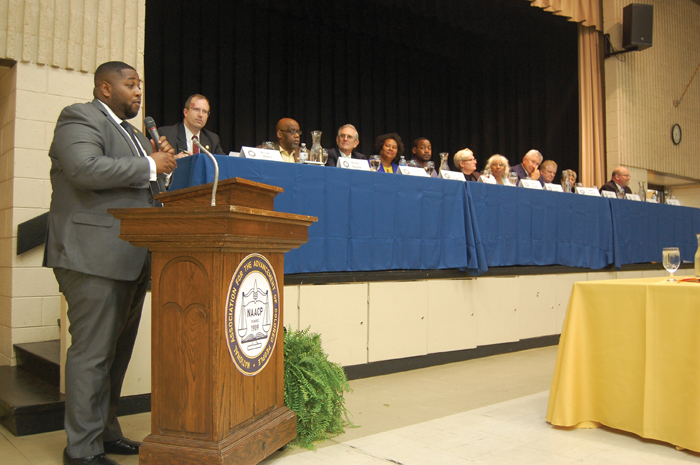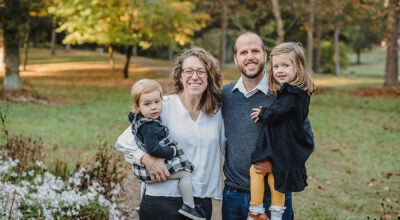NAACP candidate forum talks about city’s changing demographics
Published 12:22 am Friday, September 22, 2017

- The Rev. Marcus Fairley of the NAACP opens a City Council candidates forum in Salisbury in September.
SALISBURY — At the first forum for Salisbury City Council candidate Thursday night, questions were submitted by audience members about the city budget, creating a hospitable public-comment period at council meetings, and fostering a good relationship between police and residents.
But forum moderator M.J. Simms-Maddox said the “big question” of the night was how the potential council members would handle Salisbury’s changing demographics.
“There has been some comments here and there, what the whole country is dealing with, in terms of the increasingly changing demographics in this country,” Simms-Maddox said. “And we’ve gotten a few questions from the audience that are curious as to how the city government is handling (that.)”
The question about changing demographics was the fourth and final question of the evening. Simms-Maddox noted that when some candidates were addressing the previous three questions, they talked about race.
“And we sense that you’re speaking primarily of black and white. In addition to that traditional definition of race relations, the population is very diverse,” Simms-Maddox said. “On top of that, physically and developmentally (disabled); that’s part of our population as well.”
Candidates had two minutes to address each question.
Leda Belk mentioned that another changing demographic in the community is the aging population.
“We have a community that’s aging, and we’re not friendly to the aging community,” Belk said.
John Struzick said the city already has many of the resources that people need.
“Salisbury has just about everything, but the problem is that we don’t know where to go. We don’t have a resource guide,” Struzick said. “Believe me, there is so much out there.”
PJ Ricks said City Council meetings need to be more accessible to people of all backgrounds.
“We don’t often see many people at City Council who are not black or white. We don’t see other cultures because we don’t make them welcome,” Ricks said.
Al Heggins began her response with several sentences in fluent Spanish.
“So what I just said to you is, look at this room. Look at the slate of candidates here. Look at our boards and commissions that serve the city of Salisbury. Are they reflective of our population? The answer is no.”
Kenny Hardin said many government programs meant to foster inclusion or diversity are “feel good.”
“You know, we had a program at a lynching tree. Everybody came together. Everybody then left and went back to their segregated communities,” Hardin said.
The three other questions of the night — how candidates would handle the budget, public comment and police relations — similarly highlighted the different views of candidates.
Todd Paris said that on improving police relations, officer salaries might need to be raised again because not as many people are going into the profession as in years ago.
“When something becomes scarce, you pay more for it, whether it be gravel, sand or police officers,” Paris said.
David Post mentioned a time that he had been pulled over for running a red light. He said he was able to have a conversation with the officer about why he had done it.
“I bet you, if I were black, that’s not what would have happened,” Post said, to the applause of some people in the audience. “I think that’s one issue we have to be cognizant of all the time.”
Rodney Queen said that with the Police Department as short-staffed as it is, it is difficult for officers to be anything but reactive.
“We can’t look at the Police Department to try to solve all of these problems because there’s not enough of them,” Queen said. “We as a community are going to have to jump in and support.”
The question of how to create a more hospitable public-comment period prompted Tamara Sheffield to ask why a strategy used in churches couldn’t be used in City Hall.
“What’s so wrong with having a door greeter, like they do at church?” Sheffield asked. “I’m at almost every council meeting and many times I am the person who is asking people I’ve never seen come to a meeting, ‘Do you want to do public comment? Well here’s the process.’ There’s not really anybody there to direct that.”
Brian Miller said that because he put his name on the ballot, he is “willing to take public criticism.”
“There have been a couple of occasions, in my opinion, where the discourse has gotten uncivil,” Miller said. “And while it is certainly reasonable to accept criticism from folks when you sit in this seat, there is a level of discourse that I think is appropriate for a government meeting.”
Ryan Evans said people need to have enough time to get their thoughts out during public comment.
“I believe time is a very important thing, making sure everybody has enough time to physically speak and be seen,” Evans said. “Not just two minutes, but maybe three or four, if no one else is signed up.”
After just under two hours of question-and-answer, moderator Simms-Maddox addressed the candidates and the audience.
“For someone who has moderated several candidates forums over the years in Rowan County, this is honestly one of the best-conducted that I’ve done,” Simms-Maddox said. “You have 11 strong choices from which to choose.”
Mayor Karen Alexander and candidate Latasha Wilks were both scheduled to attend the forum but were unable to make it.
The next City Council candidates forum will be hosted by Rowan Concerned Citizens at 6:30 p.m. Sept. 28 at Mission House, 120 Statesville Blvd.
Election Day is Nov. 7, and early voting will run from Oct. 19 through Nov. 4.
Contact reporter Jessica Coates at 704-797-4222.





